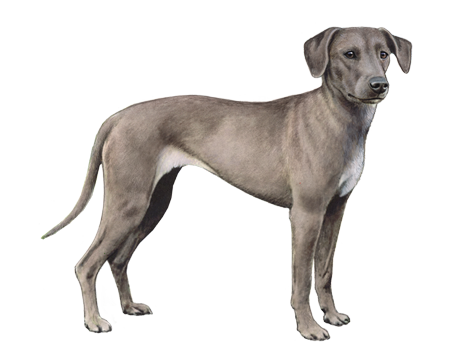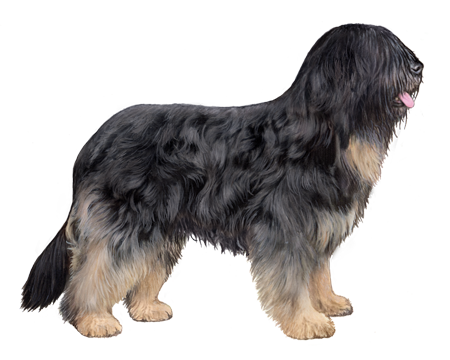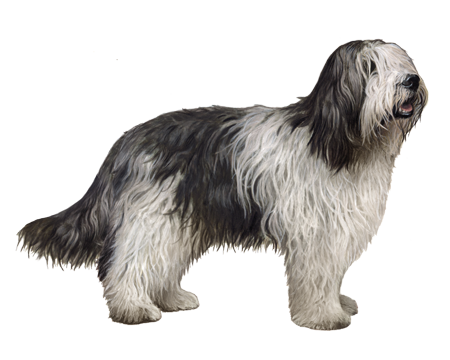
Old English Sheepdog
Old English Sheepdogs are adaptable, gentle, and smart. Despite their large size, these big balls of fluff are active and agile, and their good looks are sure to draw attention.
Interested in discovering if your dog is an Old English Sheepdog?
Check out Wisdom Panel's DNA tests.

Old English Sheepdog Traits
General Appearance
Old English Sheepdogs are muscular and compact with profuse coats. These big dogs are surefooted and agile and move with a gait similar to a shuffling bear.
Coat and Colouring
Old English Sheepdogs are known for their coats. Their double coats include waterproof undercoats and outer coats with profuse, shaggy (never straight or curly) hair.
Soft, flat coats are considered a fault for the breed. Hard-textured hair covers their skulls, necks, forelegs, and hocks.
Old English Sheepdogs come in shades of gray, grizzle, blue, or blue merle with or without white markings. The breed standard for Old English Sheepdogs doesn't permit shades of brown or fawn in the coat.
Distinctive Physical Traits
Old English Sheepdogs are thickset, muscular working dogs with short, compact bodies and long, arched necks. They have muscular hindquarters and small feet with thick, hard pads. Their eyes may be brown, blue, or one of each, and convey an intelligent expression.
Old English Sheepdog Temperament
Old English Sheepdogs are even-tempered, good-natured, and adaptable, making them well-suited to all kinds of families and living situations.
This one-time working breed does not need a job to feel fulfilled. Rather, Old English Sheepdogs can feel content lounging around the house, going for walks, and hanging out with their families. Thanks to their patient and kind natures, Old English Sheepdogs make great companions for children.
The Old English Sheepdog is an excellent watchdog. Always alert, they will let out a big bark if something seems amiss.


Old English Sheepdog History
The Old English Sheepdog breed name is a misnomer. It didn't appear on the scene until the 18th century, much later than ancient breeds developed centuries earlier. In fact, it's not a sheepdog at all—it's a drover that moved cattle from pasture to market.
The breed may have originated in Devon and Somerset, but their bloodlines also include Scotch, European, and Russian descent.
Despite the misleading moniker, the Old English Sheepdog has captured hearts and as well as the title roles in movies like The Shaggy Dog and The Shaggy D.A.
Old English Sheepdog Care
Nutrition
Feed Old English Sheepdogs a high-quality dog food that is appropriate for their life stage (puppy, adult, senior). Portion out their food with a measuring cup and limit treats to no more than 10 percent of their daily calories to prevent overfeeding.
Grooming
It takes a lot of maintenance to keep Old English Sheepdogs looking their best. The double-coated breed needs thorough grooming at least once a week to remove dead hair and prevent mats and tangles.
Some pet parents may take their Old English Sheepdog to the groomer for a “puppy cut” to keep their hair short, but even dogs with shorter coats require regular brushing and bathing.
Old English Sheepdogs also require regular ear cleanings, nail trims, and a dental care routine, including at-home teeth brushing and professional cleanings. Start these grooming essentials when Old English Sheepdogs are puppies to ensure they are part of your routine.
Exercise
Old English Sheepdogs are a moderately active breed. Regular walks, trips to the dog park, or games in the backyard will help keep them healthy and happy.
Prioritize activities that provide mental and physical stimulation such as hide-and-seek, fetch, or puzzle toys to help your Old English Sheepdog burn off some energy.
Training
These are intelligent dogs that can easily master basic commands but will quickly become bored with repetitive training. Keep Old English Sheepdogs engaged with a consistent (but varied) training routine that incorporates positive reinforcement and rewards. Socialization is important, too. Introduce Old English Sheepdogs to new people, pets, and places to help them become well-mannered, well-adjusted dogs.

Old English Sheepdog Genetic Health Conditions
-
Hemophilia A (Discovered in Old English Sheepdog)
Hemophilia A, also known as Factor VIII Deficiency, is a blood clotting disorder, which can cause bruising or abdominal bleeding without apparent reason. The disease is more commonly seen in male dogs.
-
Cerebellar Ataxia
Cerebellar Ataxias (CAs) are a group of disorders in which there is a degeneration in the movement center of the brain, known as the cerebellum. The degeneration leads to a lack of coordination in movements.
-
MDR1 Medication Sensitivity
The MDR1 gene variant causes a defect to a drug pumping protein that plays an important role in limiting drug absorption and distribution (particularly to the brain). Dogs with the MDR1 variant may have severe adverse reactions to some commonly used medications.
-
Primary Ciliary Dyskinesia
Primary Ciliary Dyskinesia (PCD) is a disorder found to affect formation of the tiny hairs in the respiratory system called cilia, resulting in recurrent respiratory tract infections. As cilia throughout the various body systems are affected, it can also impact hearing and cause infertility in males.
Knowing if your Old English Sheepdog is a carrier or at-risk for these conditions can help you and your veterinarian plan for your pup's lifelong care. With Wisdom Panel™ Premium, you can get results for over 200 genetic health tests.
Breed Group
Herding
The herding group is a diverse category. These highly intelligent breeds were developed to guard and control the movement of livestock.
Resources
https://www.akc.org/dog-breeds/old-english-sheepdog/
http://images.akc.org/pdf/breeds/standards/OldEnglishSheepdog.pdf
Reviewed 26 July 2020 by Annette Louviere, DVM























































